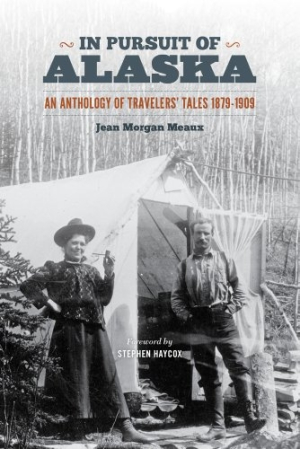In Pursuit of Alaska
An Anthology of Travelers' Tales, 1879-1909
Early accounts of Alaskan adventures illustrate the harsh but appreciable wilderness with lyrical prose.
Exotic, daunting, scenic: the words chosen to describe Alaska in the introduction to this collection are of the sort that pique adventurers. Such conceptions of the state once worked their magic on Jean Morgan Meaux, the journalist-cum-lawyer who now offers readers In Pursuit of Alaska, an anthology of historical accounts of the state’s early exploration.
The travelers represented here are a diverse bunch whose records of their Alaskan travels once inspired hosts of others to tackle the foreboding northern wilderness. Meaux happened upon their writings gradually and fell into appreciation of their sometimes poetic audacity—an appreciation in which she now invites readers to share.
Meaux begins with John Muir, the naturalist whose lyrical and admiring writings may be credited with transforming Alaska’s appeal. In 1879, he wrote home concerning Alaska’s boundless purity and singular beauty. Visitors soon followed. They came on pleasure cruises or were drawn by accounts of gold. Others were prompted, either by official directives or personal ambition, to see what of the wilderness could be traversed or conquered.
Some, like Septima Collis, came for the furs and the spectacle, and their accounts may not endear reader sympathy. For the most part, though, these travelers’ stories come from those who more intimately interacted with the wilderness—and depended on its infrequent kindness for survival. Missionaries, such as Caroline Willard and Hudson Stock, came to serve and stayed to live. Stuck’s tale in particular, which forgoes imperial sentiments in favor of respect for both the native people and their land, is a pleasure to encounter.
Others simply passed through, including Harry de Windt, who was searching for an overland route to Paris, and H. W. Seton Karr, who desperately wanted to be the first to conquer Mount Saint Elias. Then came the innumerable prospectors. Those herein went home without monetary riches, but with lifelong appreciation, even love, for the wilderness which had refused them wealth. Mary E. Hitchcock’s gold-rush tale is the only one that features both lavish living and cheerful failure. Hers is one of the more delightful stories in a collection pervaded by the sense that “conquering” Alaska has only ever meant discovering one’s human limitations in its landscape.
Meaux bookends each excerpt with rich contextualization. Her insights are welcome and helpful, as this anthology includes nearly thirty occasional Alaskans. Theirs are voices not often heard but which illumine an important period of Alaska’s development with color and verve. It’s a collection compiled with intelligence, and well worth trekking into for all those intrigued by our still-enigmatic uppermost corner.
Reviewed by
Michelle Anne Schingler
Disclosure: This article is not an endorsement, but a review. The publisher of this book provided free copies of the book to have their book reviewed by a professional reviewer. No fee was paid by the publisher for this review. Foreword Reviews only recommends books that we love. Foreword Magazine, Inc. is disclosing this in accordance with the Federal Trade Commission’s 16 CFR, Part 255.

